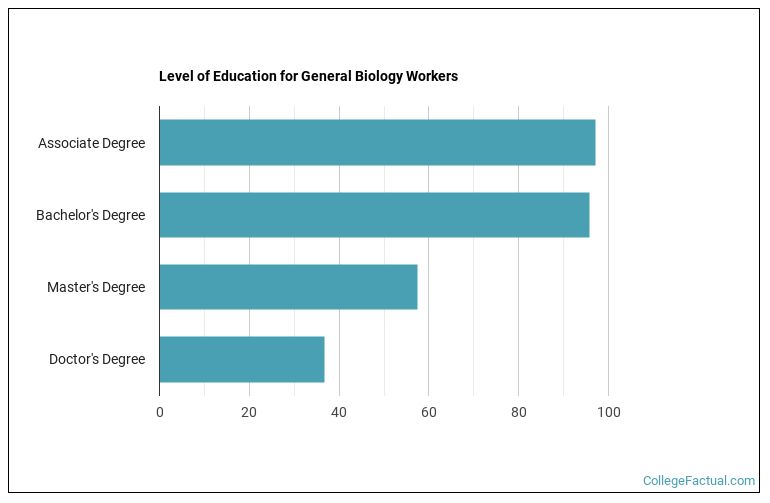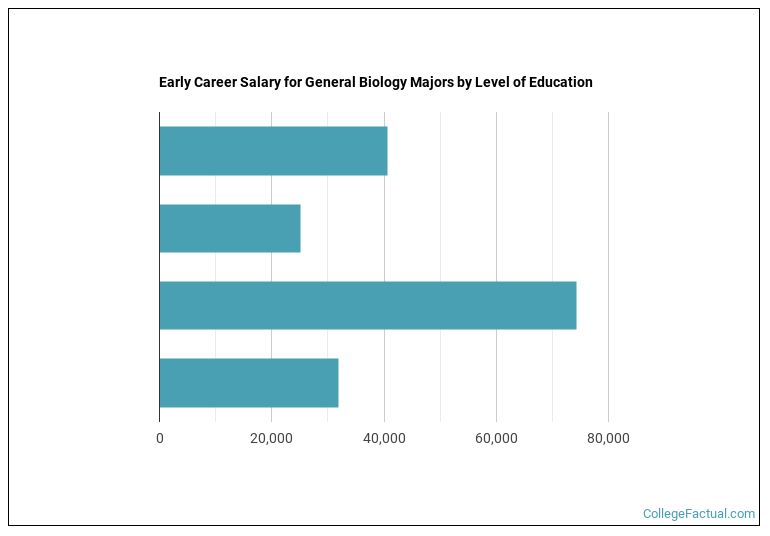 by our College Data Analytics Team
by our College Data Analytics TeamAre you interested in the study of life? A major in General Biology will allow you to study life in all forms: animals, plants, bacteria, and fungi. This includes in-depth research on different organisms, their communities, and their systems, cells, and processes that permit life.
Biology is a hands-on subject that will allow you to learn through experiments and doing. Students participate in labs and write reports on their findings. Biology will also cover how different organisms have survived and evolved over time. This major will allow you to study biology generally or biomedical sciences.
Courses may include: biochemistry, evolutionary biology, general biology, genetics, invertebrate biology, marine biology, microbiology, plant anatomy, and zoology.
General Biology was the 5th most popular major in the 2021-2022 school year. Colleges in the United States reported awarding 106,032 degrees in this year alone. This year's Best General Biology Schools ranking compares 901 of them to identify the best overall programs in the country. Explore this or one of our many other custom biology rankings further below.
Biology students are often first attracted to the subject due to a love of nature, plants and animals. You will spend a great deal of time exploring and learning about life and the behaviors that go along with it. Working in the field as well as working with animals should not intimidate you. You will also have the opportunity to work with advanced science tools like microscopes.
Studying biology is exciting and invigorating, but can include long hours in the lab performing repetitive tasks. Math and science will make up a large part of your course work. Even though your first love is science, don't forgo English. Clearly communicating scientific concepts through writing is an essential skill that can set you apart from others.
Working with others is important in this major. You will frequently work in study groups and with a lab partner. Critical thinking and a sharp memory will be necessary for your success. Students will be required to take copious notes of their experiments and faithfully record outcomes.
A high school diploma or equivalent is typically required for most biology degree programs and many students will need a minimum GPA and SAT/ACT score depending on the school. In addition to these basic general biology program qualifications, to serve in some biology careers, special certification may be required outside of your degree.
There are many different biology degree levels. General Biology programs offered by schools range from a to a , which is the highest biology degree you can get. The type of biology degree you choose will determine how long it takes to get your diploma.
| Degree | Credit Requirements | Typical Program Length |
|---|---|---|
| Associate Degree | 60-70 credits | 2 years |
| Bachelor’s Degree | 120 credits | 4 years |
| Master’s Degree | 50-70 credits | 1-3 years |
| Doctorate | Program required coursework including thesis or dissertation | At least 4 years |
A bachelor's degree is the most common level of education achieved by those in careers related to biology, with approximately 34.3% of workers getting one. People currently working in careers related to biology tend obtained the following education levels.
| Level of Education | Percentage of Workers |
|---|---|
| Bachelor’s Degree | 34.1% |
| Master’s Degree | 20.0% |
| Doctoral Degree | 18.5% |
| Post-Doctoral Training | 18.2% |
| Post-Baccalaureate Certificate | 4.2% |
57.5% of biology workers have at least a master's. View the chart below to get an idea of what degree level most of those in general biology careers have.

The education level required is different depending on the biology career you are seeking.
With a degree in general biology you have number of different career opportunities available to you. You can become a biological scientist, clinical laboratory technologist, biology teacher, forensic scientist, medical scientist, or science technician. Some students whill also choose to continue their education in graduate school. Biology majors can go on to become veterinary or medical professionals with additional education.
Want a job when you graduate with your biology degree? General Biology careers are expected to grow 8.6% between 2016 and 2026.
The following options are some of the most in-demand careers related to general biology.
| Occupation Name | Projected Jobs | Expected Growth |
|---|---|---|
| High School Teachers | 1,095,500 | 7.5% |
| Medical Scientists | 136,100 | 13.4% |
| Biological Science Professors | 71,700 | 15.1% |
| Natural Sciences Managers | 62,300 | 9.9% |
| Biological Scientists | 41,800 | 8.0% |
Recently graduated general biology students earned an average of $32,451 in <nil>. Earnings can range from as low as $10,934 to as high as $153,622. As you might expect, salaries for biology graduates vary depending on the level of education that was acquired.

Salaries for general biology graduates can vary widely by the occupation you choose as well. The following table shows the top highest paying careers biology grads often go into.
| Occupation Name | Median Average Salary |
|---|---|
| Natural Sciences Managers | $139,680 |
| Biological Science Professors | $97,340 |
| Medical Scientists | $96,420 |
| Life Scientists | $89,150 |
| Biological Scientists | $83,600 |
With over 3,207 different biology degree programs to choose from, finding the best fit for you can be a challenge. Fortunately you have come to the right place. We have analyzed all of these schools to come up with hundreds of unbiased biology school rankings to help you with this.
General Biology is one of 14 different types of Biological & Biomedical Sciences programs to choose from.
| Major | Annual Graduates |
|---|---|
| Biology Studies | 94,541 |
| General Biomedical Sciences | 11,491 |
| Related Major | Annual Graduates |
|---|---|
| Biochemistry, Biophysics & Molecular Biology | 14,558 |
| Neurobiology & Neurosciences | 12,616 |
| Physiology & Pathology Sciences | 9,568 |
| Ecology, Evolution & Systematics Biology | 7,935 |
| Cell Biology & Anatomical Sciences | 6,440 |